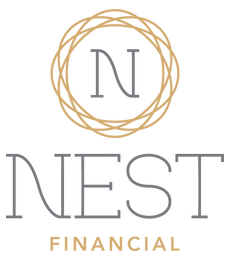October is National Financial Planning Month, and while it’s often overshadowed by pumpkin spice and Halloween, we’re glad that the powers that be set aside 31 days to commemorate such an important and life-changing practice.
“Financial Planning” sounds stuffy and prescriptive, but really it’s quite the opposite. A solid financial plan gives you freedom to explore how adjustments to your financial practices can enable you to pursue certain goals, giving you the confidence of knowing that by taking certain steps, you are manifesting the lifestyle of your dreams.
Whether you’re expecting major changes to your situation or not, a NEST financial plan can change your life for the better. Here’s an overview of financial planning basics in honor of National Financial Planning Month.
Cash Flow & Obligations
A financial plan starts with understanding what you make versus what you spend – and that latter category includes what you owe in debt, too. We’ve all heard of budgets, but very few people actually sit down and take an honest look at what they’re earning versus what they’re spending. A budget or spending plan is going to be the first step in creating your overall, long-term financial road map.
Not only does a budget empower you to make better decisions on a day-to-day basis, but it also helps you contextualize your purchases so that you’re spending and saving according to what’s really important to you. Understanding how much money you’re able to spend is going to establish a benchmark for your finances so that you can prioritize your expenses accordingly. It will also put your surplus into perspective, so that you can start thinking about things that are down the road, such as retirement or large purchases like a house or new car.
Your budget will also help you understand the magnitude of any lingering debt you might have. Budgets give you a sense of your debt and the various timelines in which you could pay it off by showing you areas where you could cut down on expenses in order to allocate more money to monthly debt payments. It can also help you understand how to better consolidate debt and understand how your debt is being accrued so that you can find creative ways to pay the least amount of interest and other finance charges.
Saving for Retirement
Traveling, spending time with family, continuing education, volunteering, and owning pets are just a few of the most common things that people plan to do once they retire. But in order to do those things it’s essential to start planning for retirement early – the sooner, the better.
Retirement savings and funds should be a priority for people once they enter the workforce. The IRS has created special tax-advantaged accounts such as employer 401(k) plans, Individual Retirement Accounts (AKA IRAs), and special retirement accounts for self-employed individuals. These accounts allow for tax deductions, tax credits, and some can even offer tax-free earnings on your retirement savings.
But once you get into the nitty gritty of these accounts, it can be overwhelming. What do you do with an employer 401(k) when you change jobs? What is a Roth IRA? What’s a 401(k) versus a SIMPLE 401(k)? Furthermore, how do market events such as inflation affect retirement savings?
A financial advisor has all the knowledge to understand the details of these different accounts and any current events or legislation affecting them, and can apply that knowledge to the specifics of your financial situation and future goals so that you’re optimizing your retirement accounts. Wealth management firms like NEST, where we have in-house portfolio management, can also be coupled with your retirement accounts, as many people recognize that investments are a great option to generate income during retirement. There are a lot of moving parts for the average person to consider, which is why it can be helpful to have a professional’s assistance.
Plan Ahead for the Fun Stuff
The purpose of a financial plan is to manifest your goals and help you to get your finances aligned with the lifestyle of your dreams. So there’s no right or wrong way to do it – only a right or wrong way for you. If your dream is to circumnavigate the globe in a hot air balloon and remodel your house so that one room is completely gravity-free – well, we’ll have to do a little research to understand the numbers associated with that, but we’re happy to help you figure out how to make that dream a reality. If your big-dollar-items look more like college tuition for your children or upgrading your mini-van to a Tesla, we want to make that a reality for you, too.
Financial planning enables you to factor in these kinds of future purchases so that you know how to spend and save today in order to manifest these exciting dreams tomorrow. Our NESTIntel software is uniquely designed to run hypothetical situations with your real-life financial numbers so that you understand how altering certain financial behaviors, practices, and decisions can affect these dreams and lifestyle changes in the future. From knowing what you can prioritize to retire earlier to what you can deprioritize to get that upgraded vehicle sooner, NESTIntel software gives you hypothetical options that become real-life possibilities.
Plan Ahead for the Less Fun – Ahem; the Responsible Stuff
In addition to fun and exciting purchases, the road ahead will also hold additional responsible purchases. Creating a budget, adjusting your financial habits, addressing your debt and retirement expenses, and contextualizing your goals and priorities has established a solid financial foundation for you and your family, which means that you’ve built something to protect as well.
Insurance can hedge against accidents and disasters, from life insurance and disability insurance to homeowners’ insurance and beyond. Again, there is no one-size-fits-all for this aspect of financial planning either – it all depends on the details of your situation and what you need. A financial advisor can use their experience and insight to assess your situation and help you decide what insurance is a good investment and what insurance is not.
Estate planning is also part of financial planning. While financial advisors are not estate lawyers, they can help you determine what kind of arrangements will work best for your assets, such as whether you need a will, a trust, or both, for example.
Financial planning can also optimize your situation during tax season. With shifting policies and administrations, it can be hard for the average person to keep up-to-date with the details of changing tax laws, and as your wealth grows, mistakes can become more expensive.
Financial Planning Services
A NEST Financial Plan helps you gain confidence in your financial future, manifest your goals, and start living the lifestyle of your dreams sooner – all while avoiding expensive mistakes and protecting your finances. NEST Financial Plans are a simple and powerful tool to optimize your finances today. We know what you’re thinking – something this great deserves more than just a month of celebration!
In addition to being the go-to financial planner for leaders and doers in Austin and Hill Country, NEST Financial also offers investment services, managing all of our portfolios in-house according to Sean’s unique process. To find out if NEST can be the one-stop wealth management resource for you, join the many other Austin-based families and individuals and start your journey with NEST Financial by emailing info@nestfinancial.net.
Find us on:
LinkedIn Facebook Yelp Twitter
DISCLAIMER: We are legally obligated to remind you that the information and opinions shared in this article are for educational purposes only and are not financial planning or investment advice. For guidance about your unique goals, drop us a line at info@nestfinancial.net.






[…] the year is generally a good time for everyone to set aside a few hours to review their finances. Reassessing your cash flow and your debt or other obligations is always a good starting point, and from there you can see whether your […]